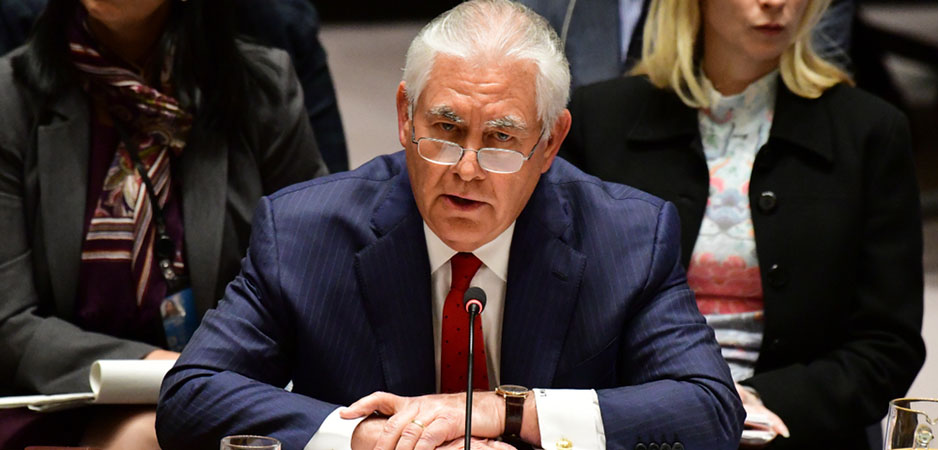One of the many unique advantages America still has — if it chooses to exercise it — is its remarkable convening power.
Reflecting on his predecessors’ Middle East efforts dating back to Henry Kissinger in the 1970s, US Secretary of State Rex Tillerson’s recent tour of Middle East capitals — in Egypt, Kuwait, Jordan, Lebanon and Turkey — appeared sadly strained and overwhelmingly, well, underwhelming.
It wasn’t for lack of issues. There were issues aplenty for America’s chief diplomat, now one year into his rocky, criticism-plagued tenure in Foggy Bottom. To name but a few:
1) Egypt’s troubled economy, contemptible human rights record, and ongoing and heretofore unsuccessful struggle with a host of Sinai-based terrorists
2) Saudi Arabia’s ill-fated three-year effort to defeat Houthi rebels in Yemen, creating one of the world’s worst humanitarian crises, and an almost single-handed, irrational effort to break up the Gulf Cooperation Council with the Qatar blockade
3) Iraq’s extraordinary needs to confront a colossal rebuilding project (approaching $100 billion) after decades of Saddam Hussein’s corrupt mismanagement, civil war and ugly Islamic State insurgency
4) Jordan’s continuing challenge as host to hundreds of thousands — unofficial estimates suggest maybe a million — Syrian refugees (both officially recognized and not), as well as the threat of an unstable and threatening Syrian neighbor
5) A Lebanon trapped between the Scylla and Charybdis of Hezbollah and Saudi Arabia and Syrian refugee encampments it cannot sustain
6) Perhaps most troubling, a major fallout with NATO ally Turkey over US support for Kurdish Syrian rebels whom Ankara violently opposes
Did I mention the 500-pound, fire-breathing dragon in the room? It’s unclear whether Secretary Tillerson did either. (That would be Syria’s civil war, of course.)
Welcome to the World’s Crisis Zone
Just to kick off the secretary’s Middle East travels, the region welcomed him with a direct confrontation between Israeli Air Force (IAF) fighter aircraft and Syrian surface-to-air missiles following an allegedly Iranian-engineered drone mission over Israel proper. The drone and Syrian rocket battery were reportedly destroyed and the vaunted IAF lost one F-16. The incident marks an ominous development in Syria’s seven-year civil war, potentially pitting Iranian and Israeli forces against one another.
Another incident around the same time resulted in US aircraft killing “scores” of Russian “contract” troops attempting to assault positions held by US-backed Syrian Democratic Forces and American soldiers in northern Syria. “Great power confrontation,” the dreaded bane of the great powers since World War II, now looms in the Middle East.
If Tillerson hadn’t known it before, he should now. This is the world’s most fraught, crisis-ridden region, a ticking time bomb packed inside a powder keg enclosed in a tinderbox set to blow at any moment. Yet he and the Trump administration seem woefully unprepared, unengaged and, dare we say, disinterested. The right words about stability, growth and peace are mouthed. And, as Tillerson did apparently so well, they appear to listen. But their actions suggest something else.
And the Action Plan Is…
In Cairo, the secretary pointedly and sadly dodged a question at a media event about President Abdel Fattah el-Sisi’s abysmal human rights record. He predictably spoke about America’s support for free and fair elections in advance of next month’s presidential elections in Egypt, as multiple credible opposition candidates mysteriously have withdrawn their candidacies. And we heard little about progress on the Sinai front, which is eroding public support for Sisi and presenting a threat on Israel’s southern border, thought to be secure since the 1978 Camp David Accords.
 In Kuwait, at an international Iraq pledging conference, Tillerson reminded the audience of America’s already $1 trillion investment — and the meter is still running —to return that country to the Iraqi people and stability. Most of that, however, came from the cost of the US military’s war effort during the eight-plus year occupation. It was a fair and understandable statement, but as the former Exxon CEO should know, it’s a sunk cost to put it bluntly. If Iraq is to be spared more instability and unrest, Iraqis will need economic opportunity and that will mean investment. The $30 billion pledged — in so far as we know, none by the US — will be insufficient, Mr. Secretary.
In Kuwait, at an international Iraq pledging conference, Tillerson reminded the audience of America’s already $1 trillion investment — and the meter is still running —to return that country to the Iraqi people and stability. Most of that, however, came from the cost of the US military’s war effort during the eight-plus year occupation. It was a fair and understandable statement, but as the former Exxon CEO should know, it’s a sunk cost to put it bluntly. If Iraq is to be spared more instability and unrest, Iraqis will need economic opportunity and that will mean investment. The $30 billion pledged — in so far as we know, none by the US — will be insufficient, Mr. Secretary.
In Amman, he teased the media — there were no details — and no doubt terrified Palestinians by announcing the now-dubbed “Kushner plan” for Middle East peace is “fairly well advanced.” Tillerson and State Department officials pointedly avoided discussing the Trump administration’s decision in December 2017 to recognize Jerusalem as Israel’s capital, which from the Palestinian perspective undoubtedly prejudices any ideas coming from Washington. There was no hint of what they might receive in compensation regarding their oft-asserted claim on Jerusalem. And while Tillerson dangled the possibility of restoring past years’ funding, Jordanians were left cringing over what to do with the 2 million Palestinian refugees in Jordan who might have to do without support from UNRWA, whose US contributions may be slashed $45 billion this year.
In Beirut, Tillerson delivered a message that Lebanese don’t need to hear: Hezbollah is a threat. The existence of the US-designated, Iranian-backed terrorist-political-social welfare-mercenary organization in Lebanon has been an uncomfortable fact of life in that country since the end of its own 15-year civil war in 1990. Saying it in Beirut standing next to Prime Minister Saad al-Hariri does not make it any more understandable or palatable for the Lebanese, nor defuse the issues it has raised with Saudi Arabia. The secretary of state offered no solutions, however, which will mollify Hezbollah Secretary General Hassan Nasrallah but few others.
Tillerson met with Turkish President Recep Tayyip Erdogan in Ankara, to address what may be the most strategically confounding challenge for the US: the falling out with a fellow NATO founding member over US support for Kurdish Syrian fighters along Turkey’s southern border. The feud between NATO allies is unprecedented. Defense Secretary James Mattis was meeting almost simultaneously with his Turkish counterpart in Rome and then Brussels over the same matter, lending further gravitas to the problem. From both Ankara and Brussels, the message was better. The stakes are so much higher with NATO’s integrity and unity on the line. Still no solution — at least none announced — but the two historic allies must talk and must resolve this issue, for the sake of the relationship as well as Syria. Amidst all the criticism of him, however, one has to wonder whether the diplomatic neophyte Tillerson is up to the task.
Surprisingly left off the itinerary was Israel. Given the downing of the Israeli fighter jet, one would have expected America’s chief diplomat to rush to counsel with his Israeli counterparts and Prime Minister Benjamin Netanyahu. Yet no such stop appeared in the offing. Worth noting, perhaps, is that the secretary apparently has not been part of the Trump administration’s efforts to bridge the Israeli-Palestinian divide. That apparently is being left solely to the president’s son-in-law, Jared Kushner, and Middle East Envoy Jason Greenblatt.
American Abdication
So, what to make of the secretary’s Mideast excursion?
For an America seemingly disengaged from the region — and, diplomatically speaking, perhaps from the world — it seemed to underscore its retreat. Wrapped up at home in budget debates, government shutdowns, immigration battles, White House scandals, senseless gun violence, furtive investigations into Russian election meddling, and hyper-partisan skirmishes on a myriad of fronts from gender politics to infrastructure spending, America appears to have abandoned the field as the global leader, despite its many formidable advantages in so many areas. It is an irresponsible abdication of not only a duty, but also of the trust many around the world placed in the US. Americans also should know that it means a decreased ability to advance their interests and their values around the world.
Tillerson’s inexplicable hatchet job on his own diplomatic service, the Foreign Service — 60% of its most senior diplomats have been forced out or retired out of frustration — further speaks to this administration’s shocking disregard for diplomacy and global leadership.
One of those many unique advantages America still has — if it chooses to exercise it — is its remarkable convening power: the ability to bring together allies and adversaries alike to work out and solve tough issues. It need not have the solutions always. But it needs to be able to cajole, entice, stroke, arm-twist and demand that nations come to the table and talk. Nowhere is this more needed than in the Middle East, beset as it is with a long rap sheet of grave and enormous problems.
That might have been a worthy leitmotif for Tillerson’s magical mystery tour. Sadly, the magic may only have been that he came at all. The mystery… why?
The views expressed in this article are the author’s own and do not necessarily reflect Fair Observer’s editorial policy.
Photo Credit: A. Katz / Shutterstock.com
Support Fair Observer
We rely on your support for our independence, diversity and quality.
For more than 10 years, Fair Observer has been free, fair and independent. No billionaire owns us, no advertisers control us. We are a reader-supported nonprofit. Unlike many other publications, we keep our content free for readers regardless of where they live or whether they can afford to pay. We have no paywalls and no ads.
In the post-truth era of fake news, echo chambers and filter bubbles, we publish a plurality of perspectives from around the world. Anyone can publish with us, but everyone goes through a rigorous editorial process. So, you get fact-checked, well-reasoned content instead of noise.
We publish 2,500+ voices from 90+ countries. We also conduct education and training programs
on subjects ranging from digital media and journalism to writing and critical thinking. This
doesn’t come cheap. Servers, editors, trainers and web developers cost
money.
Please consider supporting us on a regular basis as a recurring donor or a
sustaining member.
Will you support FO’s journalism?
We rely on your support for our independence, diversity and quality.






